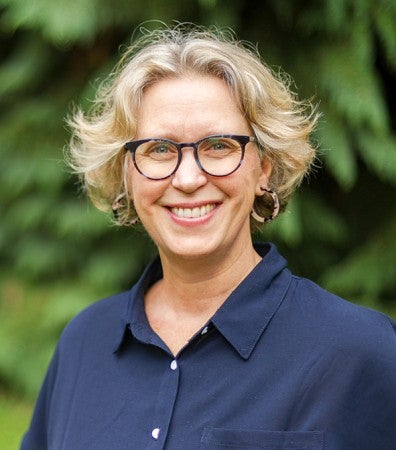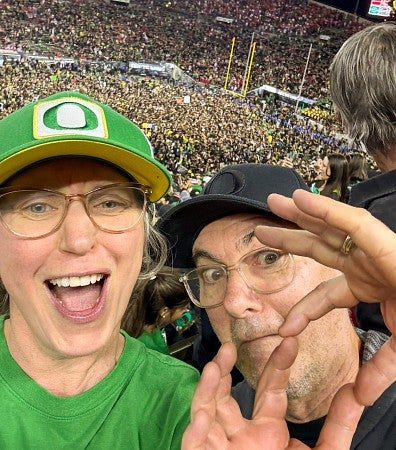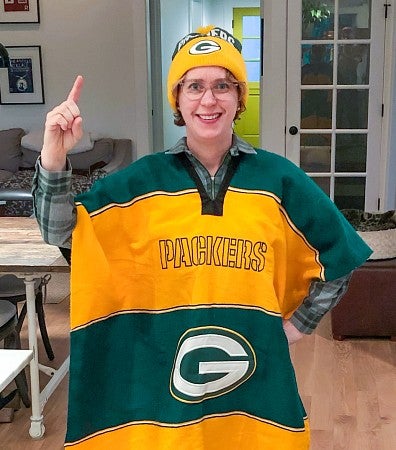
Christine Wise
Advertising Professor of Practice
Hometown: Two cities hold the feeling of home to me — Milwaukee, Wisconsin, and Seattle, Washington. My hometown of Milwaukee lives deep in my DNA. I even have a dog named Milwaukee (aka Millie). Seattle was home for the past 23 years and is where we raised our now college-age children. I guess you could say I’m a Pacific Mid-Northwesterner.
Hobbies: I absolutely love being outside — running, hiking and walking my dog on the Laurelwood Golf Course every morning. My husband would say I have a pickleball “problem.” I also love cooking delicious, locally grown foods, losing myself in a book, discussing politics and listening to a wide variety of podcasts. I will always be a hardcore Green Bay Packers fan, and I’m rapidly becoming a devoted Ducks fan of all sports.
Favorite book or book series: Tough question. I don’t have a single favorite book of all time. I tend to go through phases of reading only fiction and then periods of exclusively reading nonfiction. A few favorite books I’ve read multiple times are “The Brother’s K,” “The Art of Fielding,” “Beloved” and “The Hours.”
The thing I turn to frequently is poetry. I always have at least one poetry collection on my nightstand — e.e. cummings, Mary Oliver, Michael Ondaatje, Tracy K. Smith, Walt Whitman, Rumi, Benjamin Gucciardi, Maya C. Popa, etc. I discovered new poetry collections from the extraordinary podcast, “Poetry Unbound” with Pádraig Ó Tuama.
Favorite quote: There’s a statement that resonates deeply with me, so much that it is a mantra in my life: “Walls have doors.” Ironically, these three simple words were a Nike billboard that was strategically placed on Mile 21 of my first New York City Marathon in the late 1990s. Funny that my mantra was an ad, but these words resonate deeply with me as a runner and human.
Favorite musicians: Joni Mitchell, Prince and Taylor Swift. Yes, I’m a Swiftie. I also listen to a lot of Wilco, The National, Pearl Jam, Lou Reed, VU, REM, Talking Heads and whatever vinyl my husband is spinning.
Say “hello!”: Connect with Christine on LinkedIn or Instagram.
Christine Wise is more than your average sports fan. The professor of practice and advertising area director actually studies what keeps sports fans engaged. She’s found that the growth of a fandom isn’t singular and goes beyond a team’s performance. She measures and tracks how sports fandoms are shaped by personal, communal and expressive connections.
For example, personal connection is about how fans feel about the team and the role the team plays in their lives on a personal level, Wise says. Communal connection is feeling connected to the community who also love the team. Expressive connection — sometimes referred to as “badging,” is all about using the team brand to signal something to others. All these feelings are interconnected but distinct concepts and it is possible to be stronger in some than others.

Wise brings to the UO School of Journalism and Communication (SOJC) nearly three decades of industry experience as a strategist, creative collaborator, marketing consultant, new business driver and organizational leader. She has worked at independent creative agencies, global holding companies and directly with brands.
Her diverse industry experience ranges from promoting beloved sports teams and iconic local brands to health care, food and beverage, retail, wireless and global technology. Wise’s experience earns her frequent appointments as a final-round judge for the Effie Awards and the World Advertising Research Center’s Creative Effectiveness Awards.
Besides her work across business industries, Wise supports mental health education and advocacy for nonprofit organizations. This includes serving on the board of The Human Arc (formerly the Human Library Initative) a nonprofit that leverages narrative storytelling to improve self-knowledge and well-being.
Wise spends her personal time in nature and healthy pursuits like running, strength training, meditating and cooking delicious meals. An avid sports fan, she cheers loudly for the Ducks, the Green Bay Packers and Seattle Sounders. Wise admits to having a podcast “problem” and bingeing the latest addictive series. She enjoys time with her husband, adult children, mother and dog Milwaukee.
Wise, in her own words, delved further into her career and projects.
Who has been the biggest influence on your career?
Christine Wise: Advertising is a highly collaborative and creative pursuit, so the people I’ve worked with have definitely had the biggest influence on my career. It would be too long a list to name them all, but I will say that it includes creatives, strategists, business leaders, media minds and marketing directors. These people didn’t just make me better, they made everyone around them and the work better as a result. They taught me to take work seriously but to do so selflessly, joyfully and intentionally. I hope to influence our students to be this type of future colleague. In a highly collaborative and creative industry, this makes a world of difference.
In your LinkedIn announcement about your move to UO you said, “Despite how messy, challenging and changing advertising is today, I still believe in the magic of strong strategy and the power of creativity to solve problems that matter to people, to business and to our world.” Can you tell me how you’ll bring this mindset into your classroom and express it to students?
CW: Our incredible Associate Dean Deb Morrison is one reason why I wanted to be part of the SOJC. She’s a legend in the industry and in her words, advertising requires “critical, conceptual, creative skills that solve problems courageously.” I couldn’t agree more. I bring this to life in my classes by challenging students to practice the type of advertising the world needs. I share theories and creatively inspiring examples of advertising that tackle issues ranging from climate change and gender inequality to loneliness and diversity and inclusion.
I also focus on challenging students to think about career paths outside of “agency life.” While many students target agency roles, there are advertising roles at nonprofit organizations — causal groups like AdCouncil, media companies and brands — that are purpose-driven. As one of the leading advertising education programs, we empower students to be leaders who can shape the future of the industry, which necessitates holding advertising to a higher standard and a higher calling.
You describe yourself as “an insatiable student, researcher and champion of the art and science of marketing and advertising and the human behavior it impacts and draws upon.” Can you tell us more about your specific interests in advertising? What projects have you worked on that highlights that interest?
CW: I’m a professor of practice, meaning I come to the SOJC from the career track. My interests are reflected in the work I do with clients and nonprofit organizations. For example, I just completed a fascinating research and strategy project for well-known brands working to address the global mental health crisis by leveraging the healing power of pets. I believe in brand responsibility and seek out brands powered by a purpose beyond profit. I also have a passion for sports and have been fortunate to work with a number of incredible organizations such as Seattle Sounders, Seattle Seahawks and the University of Washington Huskies, along with sports brands like Nike and Brooks. Sports is unique in bringing diverse groups of people together and is one of the few monoculture moments we share on a regular basis.
My experience in sports has led to a specialization in growing and engaging fans. To help quantify the elusive value of fan engagement — or fandom — I partnered with faculty from University of Washington Foster School of Business to develop a proprietary research battery that can be used in sports or any brand that has an engaged fanbase. This is a project I’m proud of because it was a partnership between industry and academia. I hope to bring this type of bridge building to my work at the University of Oregon.

What content platform do you focus on in your work?
CW: This is a fantastic time to create advertising because there are endless channels (traditional and digital), and these channels are being integrated in ridiculously innovative ways. Given this, I don’t have a bias for any one platform. What I do have a bias for is story making or what I call do-not-just-say advertising — experiential ideas, brand engagements, showing up “in the real world” with a companion digital experience. In a recent class, we looked at a new campaign out of New Zealand by Pedigree. It combines proprietary AI, geotargeting and first-party data to reimagine the traditional “out-of-home billboard” into engaging ads for shelter dogs. The result is significantly reduced adoption time. I love “think-different” executions like this. There are endless creative possibilities that make this a truly compelling time to enter the industry.
What are your main research interests?
CW: My main interests surround creative effectiveness, sports and brand fandom, activating brand purpose, and ensuring high-value membership or loyalty programs.
How do you plan to incorporate your past work and interests into the classroom?
CW: As the saying goes, the best way to predict the future is to create it. My goal is that our students are prepared to do just that. I want our students exposed to theory and inspired by the messy and energized process of practice. Of course I want students to walk away with the critical career skills they need. But beyond that, I hope the program stokes students’ curiosity, creativity, confidence and determination to do innovative and important things with their talent.
What do you hope to accomplish at the SOJC?
CW: Oregon’s advertising program is well known in the industry and boasts a legacy of incredibly talented people who are living proof of what the SOJC does well. The evolved advertising curriculum is launching at the perfect time because the industry is increasingly interdisciplinary, innovative, complex and even technical. In my role, I hope to cultivate connections between academia and industry, iconic advertising of the past with innovative techniques and tools of the present, and theory and practice.

Is there an advertising campaign you admire? Is there an advertising campaign you think did poorly?
CW: I’m drawn to brands that know themselves, have a strong “why” and engage in purpose beyond just profit. Some examples of this are brands like Dove, Patagonia and Apple. I also am a sucker for creative campaigns rooted in a brilliantly simple insight that comes to life through a generous and enduring creative platform. The Snickers “You’re not you when you’re hungry” campaign is such a good example of this. The insight is spot-on, and Snickers has executed under this creative platform for nearly a decade.
The advertising work that falls far short is often inauthentic, disingenuous or what I consider “tone-deaf.” A well-known example of this is Pepsi’s 2017 fake protest ad with Kendall Jenner. I honestly can’t believe they ran that ad. A more recent example is Apple’s latest iPad ad known as “Crush.” I typically love Apple ads, but this one was a failure for me given the societal concern people have about how tech and gen AI may destroy humanity. I understand the intention of all the power to create in a thin iPad, but whoa, don’t destroy the tools of artists. Yikes.
What are three things you want every student to know about you?
CW: 1. I consider myself more of a student than a teacher. I am addicted to learning. Continuously learning about people, new categories, brands, subcultures, technology, media channels and business challenges is one of the main reasons I love the advertising industry. It is hard to be an expert because the landscape is dynamic and ever-changing. So if a student is passionate about something, I’d love to learn from them.
2. I love being a mom and love young adults. I have a 22-year-old daughter who lives in New York and is a senior in college. I also have a 19-year-old son who is in his second year at the University of Oregon. So yes, I followed my son to college. And no, he was not super stoked about the idea at first. But thankfully, he is an incredible human who is always supportive and encouraging.
3. I am obsessed with pickleball and backgammon, so if you are into either one, game on.
—By Ethan Donahue, class of ’26
Ethan Donahue is a journalism major with a double major in history. He is part of the School of Journalism and Communication’s direct-admit and honors programs. He is also part of the Clark Honors College. He holds an interest in investigative and conflict journalism and is working on a thesis focusing on how journalism, propaganda and the U.S. government interact during conflicts.
